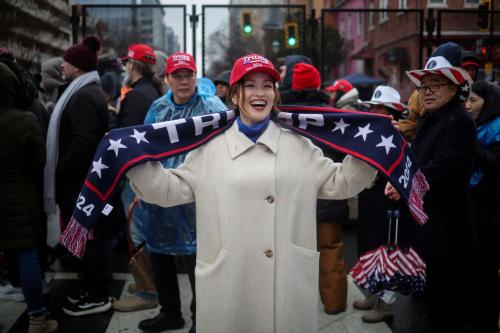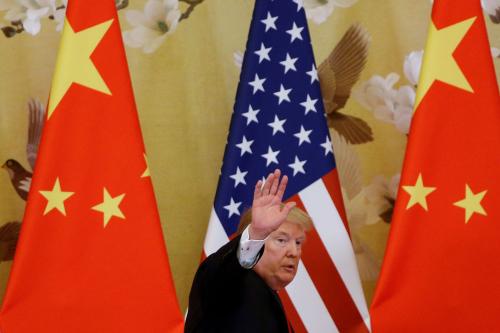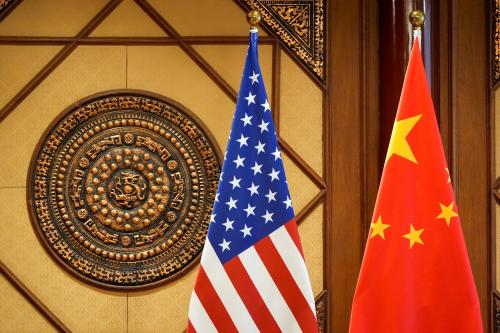What was once improbable—even imponderable—in Chinese politics has now become yet another symptom of a new normal. On November 28, 2024, the People’s Republic of China (PRC) Ministry of National Defense announced that Admiral Miao Hua, until then the director of the Political Work Department, had been suspended from his position and was under investigation. Thirteen years into Xi Jinping’s tenure at the top, it can be hard to recall that prior to Xi’s rule, toppling members of the Central Military Commission (CMC) was unheard of in the post-Mao era. Xi, however, has now made the removal of CMC members a regular feature of China’s politics—toppling no fewer than seven serving and former members of the CMC since becoming chairman of the CMC in 2012. These terminations have been dramatic affairs—with one former vice chairman dying of cancer after being purged following more than 40 years of military service, and one of Miao’s predecessors committing suicide.
The ouster of yet another sitting CMC member only further reinforces what have become the three verities of Xi’s anti-corruption campaign in the military:
- Corruption is an endemic problem in the People’s Liberation Army (PLA).
- Xi is serious about rooting out corruption.
- The persistence of corruption undermines Xi’s confidence in the PLA.
The last point is the crucial one for Xi—and why he has even been willing to remove from the high command officers whom he has personally elevated. After all, Miao is just the most recent CMC member Xi has ousted in his third term, after purging the previous two ministers of national defense in 2024, both of whom had been deeply involved in core aspects of the PLA’s weapons modernization before taking on the largely ceremonial role of defense minister. Xi’s sangfroid toward those in his own orbit reflects the gravity of his concern that actions by Taiwan, the United States, or other factors could force him to turn to the PLA—and that he needs real options. Xi’s concern is not new, but it is as stubborn and persistent as the corruption he seeks to eliminate. This is no parlor game for Xi, and at this point in his tenure, these purges are about both politics and proficiency. Xi is quite serious when he says that he wants the PLA to prepare to “fight and win battles”—a turn of phrase that itself implies that the PLA is not ready. The fact that these corruption investigations have had little discernible negative impact on the PLA’s capabilities or operations—at least from afar—probably only reinforces Xi’s belief in the salutary effects of these kinds of purges.
Prologue on the Political Work Department
We do not know the exact reasons for Miao’s sudden downfall, but situating it in the full arc of Xi’s anti-corruption crusade in the PLA does help illuminate the ruthless logic that has shaped the cadence of these roving purges. In many ways, Xi’s toppling of Miao returns the story to its point of origin: the political commissariat of the People’s Liberation Army. Political commissars are a peculiar feature of the Chinese military—and are part of the PLA’s inheritance from the Soviet Union. During the Russian Civil War, Leon Trotsky instituted the practice of installing political commissars alongside military commanders as dubious “white” units defected to the Red Army to ensure that their expedient enthusiasm for the Red Army would not wane—and to ensure that the Red Army would not be double-crossed on the battlefield. In the PLA, the political commissar system dates back to the Gutian Conference in 1929, where Mao Zedong imposed the institution on the high command over the objections of more professionally oriented officers. Notably, Xi convened a significant conference of his own high command in Gutian in 2014—as a not-so-subtle reminder to the PLA of the Chinese Communist Party’s supremacy over military affairs. In 2015, Xi abolished the old General Political Department (GPD) as part of a massive reorganization of the PLA and reincarnated the institution as the Political Work Department (PWD).
Within the PLA, the PWD still plays a crucial role in ensuring the party’s control over the military—and ironically, it is therefore a natural focal point for ambitious military officers to build up their own factions and political power. This is especially true since the PWD and its predecessor organization oversaw personnel—affording the department’s chief huge leverage over the officer corps, since he and his political allies would have enormous leeway to decide who would be put forward for promotion. The GPD was actually even more powerful since it could decide whose corrupt activities could be protected, and who could be targeted for investigation—which is probably why Xi wrested these powers from the PWD and bestowed them on other elements of the reorganized high command.
That is also why the first “tiger” Xi ensnared in his anti-corruption campaign was General Xu Caihou. Xu’s last position was as the vice chairman of the CMC responsible for political affairs, and prior to that, he was the director of the GPD. In both those roles, Xu would likely have overseen every general officer promotion for the decade he was atop the high command. Xu’s long tenure at the top of this system had effectively afforded him the ability to create an army within the army by cultivating cronies throughout the high command. Nonetheless, Xi’s efforts to disgrace Xu were remarkable and almost gratuitous: after all, Xu had retired from the high command in 2013, and Xi could have just as easily quietly curtailed his activities and locked up some of his most egregious acolytes. Instead, Xi flipped the too oft used aphorism that Chinese leaders “kill the chicken to scare the monkeys” on its head: rather than going after the minions to send a signal to the so-called boss of a faction, Xi decisively decapitated the head of a major political faction inside the PLA—one which had been spawned under former CMC Chairman Jiang Zemin’s tutelage and persisted throughout the tenure of his successor, Hu Jintao. Xi thereby sent an unambiguous message to the entire high command that their livelihoods—and even their lives—were at stake with him in power.
The purge of Xu, however, was a start and not a finish for Xi. Xi not only went after Xu, but the following year he took the stunning step of purging retired General Guo Boxiong, who had served alongside Xu as CMC vice chairman. Xi’s unprecedented purge of the former top officers in the PLA gave him enormous political capital. Xi in turn spent that capital by ramming through a massive—and by many accounts, long overdue—reorganization of the PLA. This was an incredibly heavy political lift that neither of Xi’s immediate predecessors had the political strength to muster. The scale of the reorganization is not to be underestimated: for the Chinese system, it was akin to simultaneously imposing on the U.S. high command the 1947 National Security Act, which created the Department of Defense, and the Goldwater-Nichols Act of 1986, which removed the services from the operational chain of command. As a point of comparison, both those efforts sparked massive resistance from military leaders in the United States. Within China, Xi’s PLA reforms were extensive and multifaceted, meriting a whole book to unpack. The most salient point of this story, though, is that Xi’s anti-corruption campaign was a crucial element of his political strategy for gaining and exercising control over the PLA—and doing it before the end of his first term in office.
In the decade since Xu’s political and then actual demise, Xi’s anti-corruption campaign has stalked through various components of the PLA, claiming a number of victims, stoking uncertainty among the high command and keeping it off balance—and thus enhancing Xi’s control over the pillar of the party’s power. In more recent years, the anti-corruption campaign has hit the alumni and leaders of the Rocket Forces and Equipment Development Department especially hard. At some level, this evolution of the anti-corruption campaign is intuitive. Given the scope and scale of the PLA’s modernization, it should be unsurprising that the elements of the PLA charged with developing new weapon systems and expanding the PLA’s nuclear forces might be skimming money off of these massive programs to enrich themselves. The subsequent purges last summer of former Minister of National Defense Li Shangfu and his predecessor, Wei Fenghe, seem unremarkable in this context; after all, Li had served in the Equipment Development Department just before his switch to the Ministry of National Defense, and Wei had previously spent the entirety of his career in the rocket forces. These corruption investigations really did seem to be about disappearing dollars and accountability than about elite politics or Xi’s personal control over the PLA—or even deeper questions about party control and loyalty that animated the early phases of Xi’s early anti-corruption campaign efforts in the PLA.
Why did Xi topple Miao?
Xi’s decision to topple Miao is more mystifying than these previous cases since the trajectory of Miao’s career—and especially its acceleration after Xi’s own ascent to the top of the CMC—suggests that Miao was in fact a close associate of Xi. Miao ascended through the ranks of what used to be called the Nanjing Military Region—which geographically overlapped with Xi’s bailiwicks as governor of Fujian Province and then party secretary of Zhejiang Province. In 2014, as Xi’s anti-corruption campaign roiled the high command, Miao moved from a relatively obscure position as deputy political commissar in the Lanzhou Military Region to become the PLA Navy’s political commissar, in the process making the unusual move of switching services. As Xi scoured the PLA leadership in his early years, Miao seemed to be one of the primary beneficiaries, likely thanks to Xi’s patronage.
Over the past year, however, Xi has refocused attention on the problem of political loyalty in the PLA. In June, he dragged the high command to a very unusual Political Work Conference in Yan’an, which had been a revolutionary base of the Chinese Communist Party from 1937 to 1947. The official PRC readout made an explicit link between this conference and the one that Xi hosted a decade earlier in Gutian. In the official readout, Xi said the “armed forces must always be led by those who are reliable and loyal to the Party, and there must be no place for corruption within the military,” and that he analyzed the “deep-seated problems that need to be addressed in military political work.” Xi’s comments may just have been a genuine expression of concern about the deficiencies of the PLA’s political indoctrination, but in retrospect, it is possible that they may also have been an early indication of trouble for Miao, since he had been responsible for political work in the military for the previous seven years.
Of course, we do not know what internecine politics and mistaken decisions by those involved led to this most recent eruption and must therefore tread with caution in understanding how this happened. There are several plausible hypotheses as to why Xi toppled Miao. Of the many rumors floating around in the ether about Miao’s demise, the hypothesis that Miao had engaged in what the CCP used to call “mountain top-ism” (i.e., establishing his own political faction, or “mountaintop”) seems perhaps the most plausible given the role that political commissars play in personnel decisions, though the evidence for this hypothesis is admittedly scant. Some observers have since claimed that Minister of National Defense Dong Jun might be next, asserting a link between Dong and Miao since they had both served in the Navy.
However, this analysis seems dubious given the brevity of Miao’s tenure in the Navy. While PRC officials can form alliances of convenience with other officials, they more typically tend to rely on and promote allies with whom they have formed deep personal bonds over decades. For example, Xi has known many of his allies on the Politburo Standing Committee for decades, not years. Miao may very well have promoted his own people within the PLA, but identifying them from afar would be particularly challenging since so many of Xi’s other likely acolytes in the PLA—like Miao himself—would likely have come up through the ranks of the Nanjing Military Region (MR), making it difficult to disentangle whether they were primarily associated with Miao or had a direct nexus with Xi.
The best way to identify probable Miao proteges would be to see if other members of the high command came up through the same group army as Miao, since most PLA officers spend the bulk of their career in a single group army—and therefore are more likely to form allegiances with fellow officers from the same group army. Miao spent most of his career in the 31st Group Army in Nanjing MR, starting as a soldier there in 1969 and remaining there until 2005. However, Joel Wuthnow at the National Defense University has made a robust case that officers from the 31st Group Army were not, in fact, overrepresented during Xi’s first two terms in the PLA high command, which he demonstrates contained a roughly even distribution of alumni from the various group armies. Moreover, one could very well counter there are other good reasons to promote officers from the 31st Group Army: operationally, these officers have direct exposure to the PLA’s top mission priority—Taiwan; and politically, Xi—as noted earlier—spent the preponderance of his career in the Nanjing MR, and may have crossed paths with some of these officers.
To discern whether Miao was, in fact, building up his own political base, perhaps we should look not just at who goes up, but also at who goes down. Several senior officers in the high command did overlap with Miao in the 31st Group Army: General Lin Xiangyang, commander of the Eastern Theater Command, which has primary responsibility for the Taiwan mission; Zheng He, the former political commissar of China’s National Defense University; and, of course, CMC Vice Chairman He Weidong. If any of these figures are ousted in the coming months, it could suggest that Miao’s primary crime was in fact building up his own mountaintop—or at least that Xi may have suspected Miao of such activity. Since Miao’s removal, two other senior officers—Lieutenant General You Haitao, who previously was deputy commander of the PLA Ground Forces, and Vice Admiral Li Pengcheng, who was the commander of the Southern Theater Command Navy—were removed on December 25, but so far, their cases lack an obvious nexus with Miao’s.
There are also other reasons why Xi could have allowed Miao’s removal. Miao could very well have engaged in the type of sordid graft and kickbacks that seemed to have become endemic in the pre-Xi era. Perhaps Miao miscalculated that any relationship he might have with Xi would protect him and misjudged that his predecessors’ real sins were not having a prior affiliation with Xi—rather than their material greed. This is possible, but seems less likely, especially if Xi in fact propelled Miao’s ascent. It would seem remarkable that an officer operating at that level of Chinese politics would fail to comprehend Xi’s genuine desire to expunge graft and corruption in the PLA—and the perils of undermining that ambition. “Corruption” also comes in a wide variety of flavors in the CCP, so it is also possible that some other kind of political corruption, such as saying something untoward about Xi or having an inappropriate relationship—or even just being accused of any of these activities by a rival—could have led to his ouster. To err is all too human, and therefore, we cannot entirely rule out these simple possibilities.
For all the sturm und drang Miao’s downfall has likely engendered behind the scenes in the PLA, it remains difficult as an outside observer to discern how even this latest episode amounts to more than another installment of a drama whose plot and moral themes are well established. The only pieces that have really changed in this iteration are the characters being targeted.
What does Miao’s demise mean for Xi and the PLA?
Miao’s removal will likely have little to no impact on Xi’s stature within the party and military, aside from reinforcing the uncertainty in the high command that buttresses Xi’s dominance. Some observers have argued that Miao’s downfall might embarrass or otherwise diminish Xi. That notion seems mistaken given how the system operates under Xi’s rule. By definition, if Xi allowed Miao’s removal to go forward and be publicized, it means this move would on balance advance Xi’s power or policy, not undermine it. If this did embarrass Xi, the investigation would never have gone forward and certainly would not have been publicized. The investigations of the party’s inspectors are not an episode of “Law & Order,” in which diligent detectives just follow the facts wherever they go. Any move against the political commissars is by its very nature political.
Some commentators have made similar claims about the downfall of the previous two defense ministers, but the logic here is even more tenuous. The defense minister is arguably the least consequential member of the high command, particularly since the position seems to have been evicted from the Central Military Commission after Li Shangfu’s downfall. In fact, the incumbent defense minister, Admiral Dong Jun, is not even a state councilor—a concurrent position traditionally held by his predecessors in the post-Mao era. This is a marked diminution of the defense minister’s position from prior decades—when the position was a kind of sinecure for a seasoned and respected PLA officer, who in some instances concurrently served in the more consequential position of CMC vice chairman. Indeed, it is a notable peculiarity of the Chinese system that the Defense Ministry is the only ministry with no vice minister—underscoring that it is merely there as a façade for engaging foreign militaries, rather than as a major player in the high command and military policy. The purge of the previous two defense ministers is not an embarrassment for Xi, but a demonstration of how diminished this state role is and how Xi views even top military officers as disposable.
Other observers have raised the question of what this means for Xi’s grandiose military ambitions. Again, as the most recent Report to Congress on Military and Security Developments Involving the People’s Republic of China amply documents, the PLA’s modernization continues at a disconcertingly impressive pace. The paradox of the PLA—and perhaps even of China more broadly—is that corruption and competence have somehow coexisted for decades. The corruption is quite real, but so is the PLA’s remarkable progress in its modernization program.
-
Acknowledgements and disclosures
The author would like to thank Allie Matthias for her research assistance on this piece.
The Brookings Institution is committed to quality, independence, and impact.
We are supported by a diverse array of funders. In line with our values and policies, each Brookings publication represents the sole views of its author(s).







Commentary
Thoughts on the political demise of Miao Hua
What was once improbable in Chinese politics has now become yet another symptom of a new normal.
February 18, 2025